
Cepora nerissa, the common gull, is a small to medium-sized butterfly of the family Pieridae, that is, the yellows and whites, which is native to Sri Lanka, India, China, southeast Asia, and Indonesia.
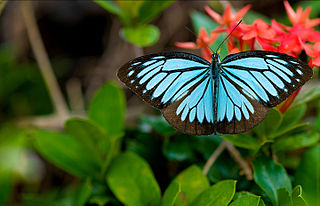
Pareronia valeria, the common wanderer or Malayan wanderer, is a medium-sized butterfly of the family Pieridae, that is, the yellows and whites, and is found in India and Southeast Asia. The butterfly found in India is sometimes considered as a separate species, Pareronia hippia.

Papilio alcmenor, the redbreast, is a species of swallowtail butterfly found in South Asia.

Papilio clytia, the common mime, is a swallowtail butterfly found in south and southeast Asia. The butterfly belongs to the subgenus Chilasa, the black-bodied swallowtails. It serves as an excellent example of a Batesian mimic among the Indian butterflies.
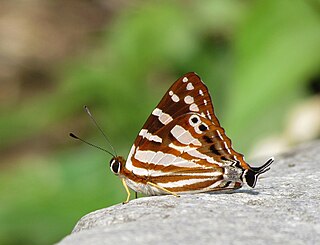
Dodona egeon, the orange Punch, is a small but striking butterfly found in the Indomalayan realm - in Mussoorie to Assam, Burma (nominate) and Peninsular Malaya that belongs to the family Riodinidae.
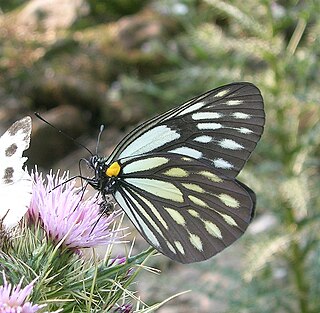
Aporia agathon, the great blackvein, is a mid-sized butterfly of the family Pieridae, that is, the yellows and whites, which is found in Nepal, India, China and Southeast Asia.
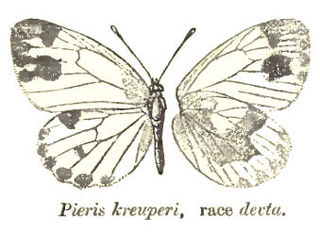
Pieris krueperi devta, the green-banded white, is a small butterfly of the family Pieridae, that is, the yellows and whites. It is found in India and Pakistan. It is a subspecies of Krueper's small white.
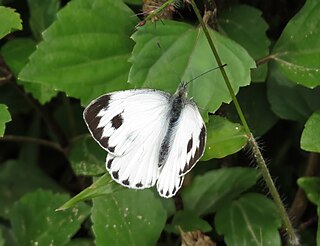
Pieris canidia, the Indian cabbage white, is a butterfly in the family Pieridae found in India, Nepal and Indochina. Pieris rapae is one of the most closely related species in the Pieridae.

Ixias pyrene, the yellow orange tip, is a small butterfly of the family Pieridae, that is, the yellows and whites, which is found in Sri Lanka, India and southeast Asia.

Hebomoia glaucippe, the great orange-tip, is a butterfly belonging to the family Pieridae, that is the yellows and whites. It is found in the Indomalayan realm and Wallacea.

Colotis etrida, the little orange tip, is a species of butterfly in the family Pieridae. It is native to India, Sri Lanka and Pakistan.

Cepora nadina, the lesser gull, is a small to medium-sized butterfly of the family Pieridae, that is, the yellows and whites. The species was first described by Hippolyte Lucas in 1852. It is native to Sri Lanka, India, Myanmar, Hainan, and southeast Asia.
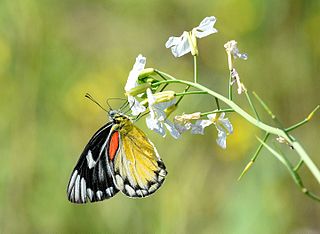
Delias descombesi, the redspot Jezebel is a medium-sized butterfly of the family Pieridae, that is, the yellows and whites.

Delias pasithoe, the redbase Jezebel is a medium-sized butterfly of the family Pieridae, that is, the yellows and whites. The species is found in parts of South Asia and Southeast Asia. There has been some dispute for which species the specific name aglaja, used twice by Linnaeus in 1758, applies – the redbase Jezebel, or the dark green fritillary, a brush-footed butterfly. Here, Delias pasithoe is used for the redbase Jezebel, based on the replacement name proposed by Linnaeus himself.
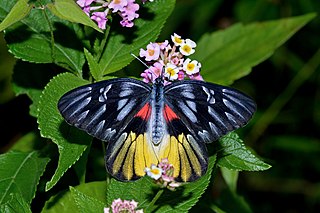
Delias acalis, the redbreast Jezebel, is a medium-sized butterfly of the family Pieridae, that is, the yellows and whites.

Pontia callidice, the lofty Bath white or peak white, is a small butterfly of the yellows and whites family (Pieridae), which occurs in the Palearctic realm.

Miletus symethus, the great brownie, is a small butterfly found in India that belongs to the lycaenids or blues family. The species was first described by Pieter Cramer in 1777.
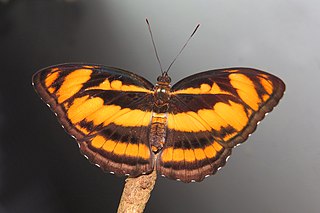
Athyma nefte, the colour sergeant, is a species of brush-footed butterfly found in tropical South and Southeast Asia.
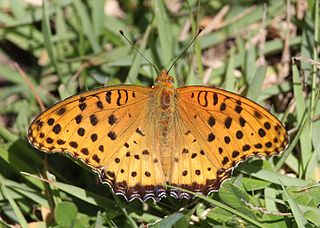
The Indian fritillary is a species of butterfly of the nymphalid or brush-footed family. It is usually found from south and southeast Asia to Australia.

Pareronia hippia, the common wanderer or Indian wanderer, is a medium-sized butterfly of the family Pieridae, that is, the yellows and whites. It is found in India. Some authors consider this as a subspecies of Pareronia valeria.





















